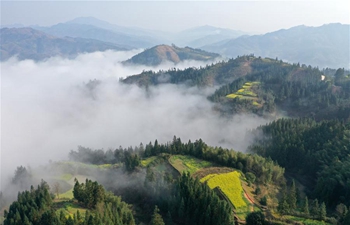SAN FRANCISCO, March 13 (Xinhua) -- A marine heatwave during the 2014-2016 period has pushed an unprecedented number of warm-water species traveling northward beyond Northern California, a new study said Tuesday.
Scientists from University of California, Davis (UC Davis) documented dozens of southern marine species typically seen only in places like Baja California, Mexico, showing up in waters outside the UC Davis Bodega Marine Laboratory, about 104 km north of San Francisco.
Among 67 rare, warm-water species that were spotted in California and as far north as Oregon, 37 had never been found traveling to the waters so far north, said the study, whose results were published Tuesday in the journal Scientific Reports.
Those warm-water species included jellyfish, crabs, nudibranchs, fish, dolphins and sea turtles.
The pelagic red crab swam all the way as far northward as Newport, Oregon during 2014 and 2016, when the ocean temperature grew warmer by 3.5 to 7 degrees Fahrenheit from the normal range from 50 to 55 degrees Fahrenheit (10 to 12.8 degree Celsius), according to the study.
The rise in the temperature of ocean water resulted from some oceanographic events such as a mass of warm water known as "the blob" moving from the Gulf of Alaska south along the Pacific coast, and a major El Nino event that traveled from the equator north to California, said the research.
"Against the backdrop of climate change, we hope (more) southern species will track northward because that's necessary for their persistence and survival," said Eric Sanford, the study's lead author and UC Davis Professor of Ecology and Evolution.
The research attributed the migration of the warm-water species to northern waters to the unusually warm water conditions created by the combination of the oceanographic events and the El Nino phenomenon.
Sanford said the observation of the warm-water species in their changed pattern of life in ocean suggests they are adapting to warming oceans, which is "a barometer of change for these ecosystems."












